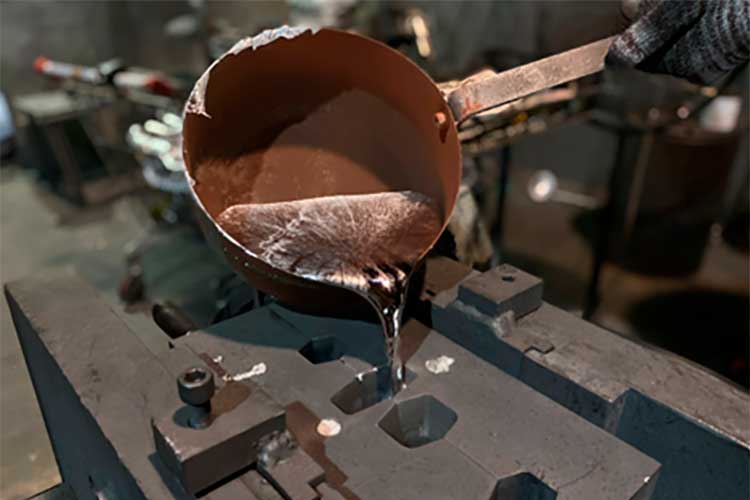Aluminum Gravity Casting
Aluminum gravity casting is one of the most widely used metallurgical procedures for manufacturing high-quality and precision aluminum parts. This method involves pouring molten aluminum into aluminum casting molds without applying external pressure, allowing the metal to fill the mold cavity due to the effect of gravity. This technique is especially suitable for manufacturing components with complex shapes and superior mechanical properties.
The phases of the aluminum gravity casting process:
1. Mold preparation:
We should mention that the molds used for aluminum casting are designed and built in steel or cast iron to ensure they can be used for an extended period of time. To prevent thermal shock, the mold is preheated and a release agent is applied to facilitate part extraction and ensure good surface finish of the cast part.
2. Aluminum melting:
It is melted in a furnace at temperatures ranging between 660 °C and 750 °C depending on the material being used for casting. Temperature control and composition of the molten metal are very important as this will be decisive for the quality of the final part.
3. Pouring of molten metal:
When the aluminum reaches the desired temperature, it is poured into the mold cavity using a ladle. Gravity facilitates the metal flow to fill all mold spaces, accurately reproducing the geometry.
4. Solidification and cooling:
The liquid aluminum cools and solidifies inside the mold. The cooling rate of the material can influence the mechanical properties of the part, which is why proper mold design and use of suitable materials for each process is very important.
5. Demolding and finishing:
Once the part is solid, it is demolded. There is a final phase that the part may undergo, these processes may include machining or surface treatments. These are typically used to meet required specifications for part functionality and aesthetics.
ALUMINUM CASTING MOLDS
We can say that the most common applications of aluminum gravity casting are: the automotive industry, aerospace industry, electronics, industrial machinery sector, among many others.
Notable advantages:
• High dimensional precision, aluminum gravity casting allows obtaining parts with tight and well-defined tolerances, making it possible to avoid subsequent machining processes.
• Good surface quality: Cast parts present smooth and uniform surfaces, which improves their appearance and facilitates subsequent surface finishing treatments.
• Superior mechanical properties: Having controlled solidification phase and being able to cast with a wide range of alloys prevents internal porosity and results in parts with high mechanical strength and durability.
• Production profitability: Aluminum casting molds allow efficient and cost-effective serial production as processes can be automated by adapting molds to machines to speed up the casting process.
ALUMINUM CASTING
To carry out this process efficiently and with optimal results, it is essential to have high-quality aluminum casting molds. In this context, companies specialized in manufacturing these molds play a crucial role. Unimold is a leading company in this field, dedicated to manufacturing aluminum casting molds that meet the highest standards of precision and quality, significantly contributing to the success of casting processes in various industries.
Learn more about our mold manufacturing services: www.unimold.es

